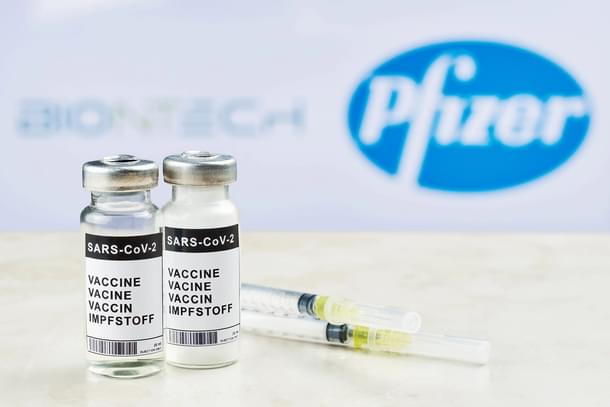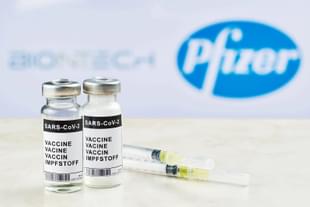News Brief
Pfizer Wants Approval For Covid-19 Booster Shot; FDA, CDC Don't See The Necessity
Bhaswati Guha Majumder
Jul 12, 2021, 12:18 PM | Updated 12:33 PM IST
Save & read from anywhere!
Bookmark stories for easy access on any device or the Swarajya app.


Since Pfizer and Moderna announced that they are working on Covid-19 booster jabs, many people are asking that whether they need the third shot and when. Now, in a joint statement, the American federal agencies confirmed that people who have received two doses of vaccines do not need the booster.
The United States-based drug giant Pfizer said last week that its Covid-19 vaccine is losing effectiveness and that it is ramping up attempts to find a booster dose that can protect individuals from variants. The pharmaceutical company said it would shortly provide data on a third vaccination dose and submit it to the Food and Drug Administration (FDA), the European Medicines Agency (EMA) and other regulatory agencies. In August, Pfizer stated that it would apply to the FDA for emergency use authorisation for a booster dose. But along with FDA, the other federal agency, the Centers for Disease Control and Prevention (CDC), stated that Americans do not need boosters at this time and that it is not up to companies to choose when they are required.
According to the joint statement, the agencies said: "We are prepared for booster doses if and when the science demonstrates that they are needed". FDA and CDC clarified that those who are vaccinated are protected from variants, including the "variant of concern" Delta variant, which is now dominant in the United States. However, they advised Americans aged 12 and above who have not yet been vaccinated to get the shots as soon as possible. In the statement, the agencies noted that "people who are not vaccinated remain at risk. Virtually all Covid-19 hospitalisations and deaths are among those who are unvaccinated". The statement also added that the FDA, the CDC, and the National Institutes of Health (NIH) are conducting a rigorous, science-based procedure to determine whether or not a booster is required.
"This process takes into account laboratory data, clinical trial data, and cohort data — which can include data from specific pharmaceutical companies, but does not rely on those data exclusively. We continue to review any new data as it becomes available and will keep the public informed," the statement added.
As per the latest reports, 67 per cent of adults in the United States are partially vaccinated, and 47 per cent are fully vaccinated. While the American President Joe Biden told his administration to reach more people who are yet to receive vaccinations, his administration will shift its focus from mass vaccination sites to a smaller and more community-based approach. The Delta variant continues to show its dominance in the country, as this variant accounted for 51.7 per cent of new Covid-19 cases genetically sequenced in the United States as of 10 July.
Vaccine Booster: Yay or Nay
The World Health Organization (WHO) told CNN on 9 July: "We don't know whether booster vaccines will be needed to maintain protection against Covid-19 until additional data is collected". The UN health agency noted that limited data is available on "how long the protection from current doses lasts and whether an additional booster dose would be beneficial and for whom".
Dr Ashish Jha, who is the dean of Brown University's School of Public Health in the United States, said that there is no need for a vaccine booster now. He told CNBC, "The data is very clear, if you've got your two shots of Moderna or Pfizer or single shot of J&J, you have a very high level of protection against all variants, including Delta. I have not seen any evidence, so far, that anybody needs a third shot". Jha commented on the requirement of booster jabs after the FDA and CDC published the statement. He said that "if that evidence emerges and obviously we're going to want to take that into consideration, in my mind, I think there's little likelihood that we're going to need third shots for most people".
On the other hand, according to Pfizer and its German partner BioNTech, there is mounting evidence that people's immunity begins to wane after a certain time. It said: "As seen in real-world data released from the Israel Ministry of Health, vaccine efficacy in preventing both infection and symptomatic disease has declined six months post-vaccination, although efficacy in preventing serious illnesses remains high. Additionally, during this period the Delta variant is becoming the dominant variant in Israel as well as many other countries. These findings are consistent with an ongoing analysis from the Companies' Phase 3 study".
The drugmaker also told CNN that while protection against severe disease was maintained throughout the six-month period, a decline in efficacy against symptomatic disease and the continued emergence of variants are expected. Based on the data, Pfizer and BioNTech believe that a third dose may be beneficial 6 to 12 months after the second dose to maintain the highest levels of protection, the company added.
The American company said: "While Pfizer and BioNTech believe the third dose of BNT162b2 has the potential to preserve the highest levels of protective efficacy against all currently known variants including Delta, the companies are remaining vigilant and are developing an updated version of the Pfizer-BioNTech Covid-19 vaccine that targets the full spike protein of the Delta variant".
According to Pfizer, the first batch of the vaccine for the trial has already been manufactured at BioNTech's Mainz, Germany facility. The clinical studies are expected to begin in August, subject to regulatory approval, the drugmaker added.





